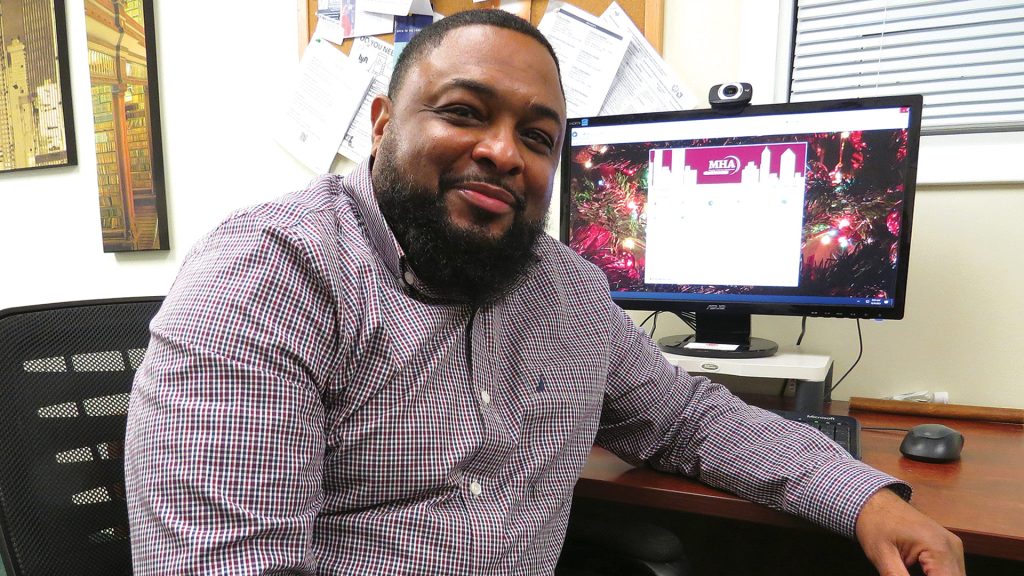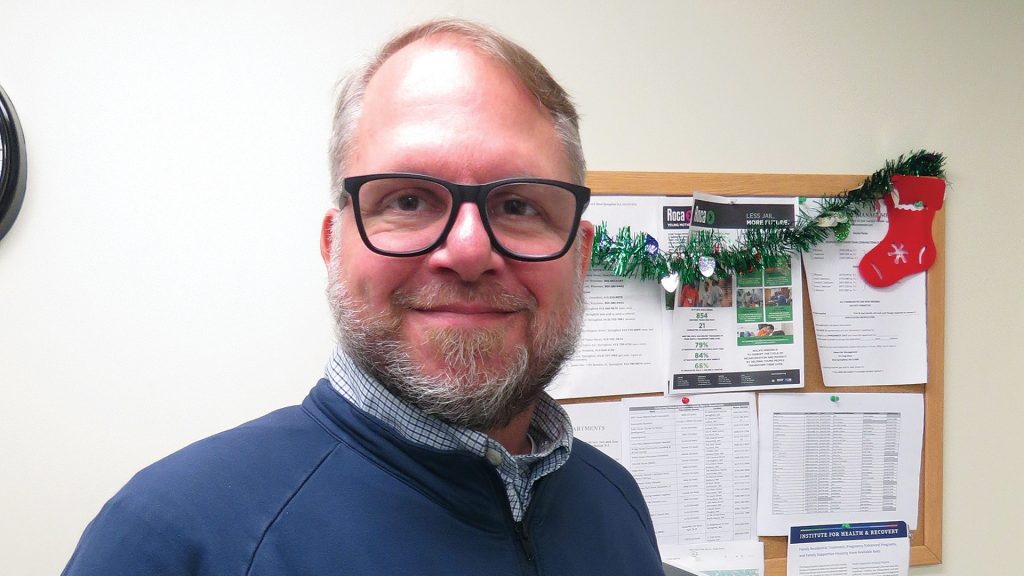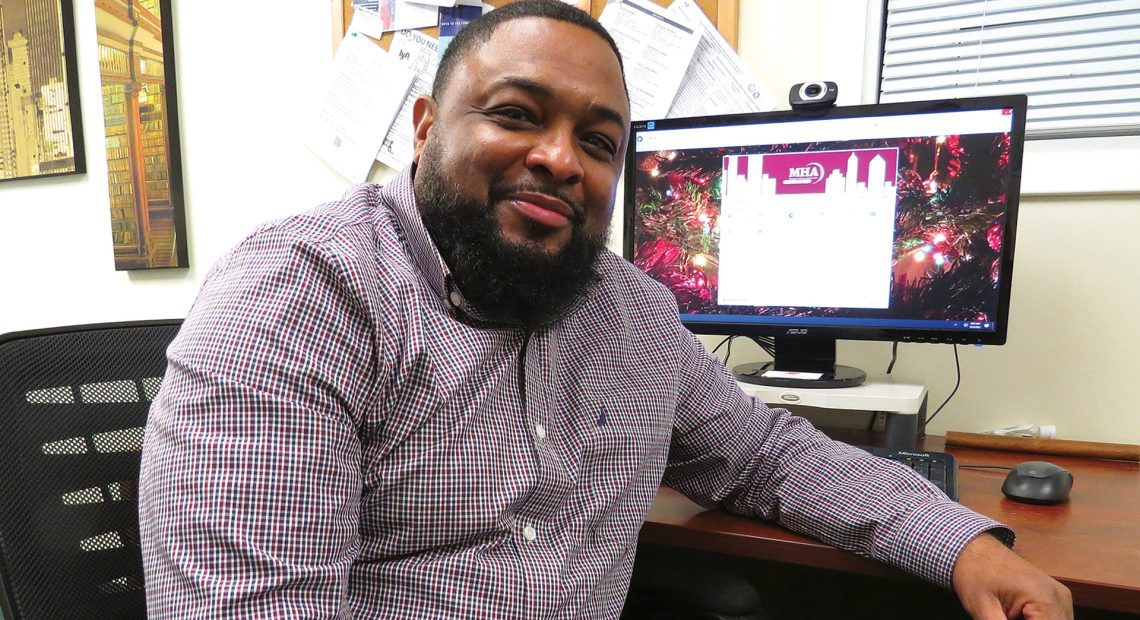Speaking from Experience
By Elizabeth Sears

Dallas Clark says lived experience and empathy are key to what makes recovery coaches so effective.
Dallas Clark is in the business of spreading empathy and sharing hope.
He is a recovery coach in the Recovery Coaching program at MHA’s BestLife Emotional Health and Wellness Center in Springfield. Inspired by the positive influence his own recovery coach had on him, Clark helps individuals who are facing the challenges of addiction to meet their goals and connect back into the community.
A recovery coach is someone who has gone through the recovery process themselves and has completed the certifications required to become a coach. They act as a bridge to recovery, a ‘concierge’ of sorts, helping clients take control and regain power in their lives by providing them with wellness plans, encouragement, and other forms of assistance.
This model of treatment works because of the trust that is built between coaches and clients. Due to walking a similar path, recovery coaches are able to understand the experiences and emotions of their clients in a way others without such life experience cannot. They know what it is like to have an addiction and can connect on a personal level with someone looking to begin their own recovery.
“The peer-to-peer counseling that recovery coaches provide is a very vital part of the process.”
“One thing that’s important about being a recovery coach is that we have lived experience. When we talk about empathy, we’ve been in those shoes,” Clark said. “I know it’s very important that you be supported by somebody that really does understand what you’re saying.”
Tommy Smyth, another recovery coach in the program, echoed this sentiment.
“The peer-to-peer counseling that recovery coaches provide is a very vital part of the process in terms of offering the comfort level of a shared experience,” he noted. “We are among the first supports someone beginning recovery encounters and often where they begin to trust the process. I continue to meet with them in addition to whoever and whatever else becomes part of their recovery.”
Recovery coaches help to motivate, support, and empower clients in a way that meets their specific needs. This help sometimes involves providing referrals. Clark recalled recently helping one of his clients find a primary-care physician and helping others with goals like finding a dentist or changing medications.

Tommy Smyth says no one should feel stigma or shame about seeking treatment for addiction.
Other times, recovery coaches help individuals communicate with their family, assist in building a broad support team, and provide resources for family members who may feel helpless. Whatever the case, clients are met exactly where they are in their recovery process, whether in the very early stages or further along.
“We collaborate on a wellness plan, prioritizing goals and building on individual strengths to empower their recovery. It is their recovery,” Smyth said. “I can use my recovery as an example and in understanding what they are dealing with or feeling, but recovery is about giving power back to the individual to take charge of their healing and eventually their lives.”
Meeting a Growing Need
MHA’s Recovery Coaching program launched on Feb. 17, 2020 — less than a month before the World Health Organization declared COVID-19 a pandemic. The inability to meet clients in person proved to be a noteworthy obstacle for coaches to try to overcome, as well as trying to bring clients back into a community that was shut down.
“The major issue was not having the one-on-one connection because recovery coaching is really based on relationship building. Not being in-person and getting to meet the individual, it was hard to build a strong relationship over the phone,” Clark said. “It was a lot of meetings being on Zoom. A lot of people didn’t know how to use Zoom, so that was a difficult part, and just connecting people back into the community.”
However, the pandemic’s impact did not mean a slow start for the program. There was only one coach at the time of its initial launch, but an immediately full caseload emphasized a need to add more staff. Since then, MHA has added four certified recovery coaches for a total of five coaches in the program. They are continuing to expand, planning to take on more coaches as needed.
“We’re starting to build collaborations with other agencies, which are providing more referrals for us, so that’s one reason we’re expanding the Recovery Coaching program,” Clark said.
The program has now shifted to a hybrid format, offering a combination of in-person and remote coaching. Also, the impact of certain resources reopening after previously closing during the pandemic has been felt greatly by members of the program.
“We’re getting back to that place now where recovery centers are back open. Drop-off centers are back open, and that’s a big plus because, when the pandemic hit, a lot of places had shut down that are recovery-oriented,” Clark said. “People didn’t have those safe places to turn to.”
Smyth spoke on the recent death of Jimmy Hayes, an NHL hockey player from Massachusetts who died from a combination of fentanyl and cocaine. Hayes’s father expressed fear of the media portraying his son as a “junkie.” In response to this, Smyth emphasized the importance of treating individuals who experience addiction with empathy and dignity, as well as providing them with the help they need.
“If you want to get help, there are people out there, including recovery coaches who have been where you are, willing to walk and fight with you. You don’t have to keep going through what you are going through alone — you can take control, and you will get your life back.”
Addiction is a disease with a gripping nature that cannot be overstated, and with the especially risky nature of drugs being laced with cheaper and more lethal substances and sold to unsuspecting buyers, resources like MHA’s Recovery Coaching program are essential for members of the community experiencing addiction, Smyth noted.
“Recovery coaches can and do make a difference. The more we can educate the public about addiction and the role recovery coaches can play, the better,” he said. “No one should be stigmatized or judged for having an addiction to a substance. No one should be made to feel shame, rejection, or failure in seeking treatment to start and sustain recovery.”
From Despair to Hope
The feelings of empathy and hope that Clark and Smyth exude can be felt in a single conversation with them. Smyth concluded with a word of encouragement for anyone seeking to regain control of their lives from an addiction.
“If you want to get help, there are people out there, including recovery coaches who have been where you are, willing to walk and fight with you. You don’t have to keep going through what you are going through alone — you can take control, and you will get your life back.”
When asked what message he would like to leave with BusinessWest’s readers, Clark spoke, without a single hesitation, of hope.
“I think the most important part is providing that hope for others. I always tell people that I didn’t know what that looked like. I didn’t even believe in myself, but somebody believed in me. I didn’t have hope — somebody gave hope to me.”






